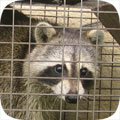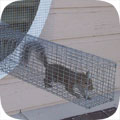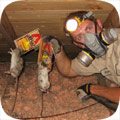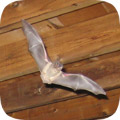- centennial@wildlifeanimalcontrol.com
Call 24/7 for a free quote:
720-439-3860
Centennial Wildlife Animal Control
Professional Wildlife Removal Company Servicing Centennial, CO
If you have a problem with wildlife in your Centennial home, your best option is to hire a company that specializes in Colorado wildlife removal only. This is a specialty business, and regular pest control companies do not use the proper techniques to solve animal problems. I have spent many years reviewing Colorado and Centennial, and I recommend the following:
Professional Wildlife Removal Services
Cell Phone: 720-439-3860
NOTE: If you have a dog or cat problem, call Arapahoe County Animal Services: (303) 325-8070

Professional Wildlife Removal Services specializes primarily in removing animals from attics of homes and buildings - this includes squirrels in attics, raccoons, and rats or mice in homes. Colorado also has a documented problem with
bats in buildings, and Professional Wildlife Removal Services is specially trained in bat removal. They also perform general wildlife trapping services, such as the capture and removal of skunks or opossums on the
property. Call 720-439-3860 to discuss your critter problem and schedule a same-day or next-day appointment. Click here to learn more about
what prices we charge in 2025.
When hiring a company to solve your wild animal problem, you want these features:
- Specializes in wildlife removal, not pest control
- Fully Colorado and Arapahoe County licensed and insured
- Works 7 days per week (critters don't take weekends off)
- Performs full building inspections: enters and inspects attic
- Performs exclusion repairs, with guarantee against animal re-entry
- Offers cleanup of biohazardous wildlife waste
Professional Wildlife Removal Services is a full-service Centennial wildlife removal company. This is very different from a regular Centennial pest control company. The pest control companies spray poison to kill insects. This is not at all
similar to wildlife removal. Professional Wildlife Removal Services performs a full inspection of the home or property, and determines why the animal(s) are there, and if inside a building, how the animals got inside. All
animals (including rodents) are trapped and removed, or if possible, removed from the building using special exclusion devices. Once the animals are gone, preventative repairs are essential, and
cleanup is sometimes recommended.
 Centennial wildlife trapping - it's not as simple as it may seem. It's illegal in Colorado to trap without a license. Trap type is very important and there are many different types, bait is somewhat relevant, trap placement
is vital, and there are dozens of small things that are very important to know.
Safety is a concern. Then once the animal is trapped, it must be removed and dealt with in the proper manner according to Colorado law. We offer Centennial raccoon removal. Read more about how to get rid of raccoons.
Centennial wildlife trapping - it's not as simple as it may seem. It's illegal in Colorado to trap without a license. Trap type is very important and there are many different types, bait is somewhat relevant, trap placement
is vital, and there are dozens of small things that are very important to know.
Safety is a concern. Then once the animal is trapped, it must be removed and dealt with in the proper manner according to Colorado law. We offer Centennial raccoon removal. Read more about how to get rid of raccoons.
 Animals in attics - this is our specialty at Professional Wildlife Removal Services. Many types of animals like to live in attics. This includes squirrels, raccoons, rats, mice, bats, birds, and even possums. Critters like to go into attics for a safe place to live
and raise their young. Removing animals from attics is very complex work, partly because of the presence of baby animals. If you need Centennial squirrel removal, we can remove all the squirrels from your attic, and seal out any future ones. Read more about how to get rid of squirrels.
Animals in attics - this is our specialty at Professional Wildlife Removal Services. Many types of animals like to live in attics. This includes squirrels, raccoons, rats, mice, bats, birds, and even possums. Critters like to go into attics for a safe place to live
and raise their young. Removing animals from attics is very complex work, partly because of the presence of baby animals. If you need Centennial squirrel removal, we can remove all the squirrels from your attic, and seal out any future ones. Read more about how to get rid of squirrels.
 Rodent control must be done in a very specific way. First off, the most important thing is that all the openings that rats and mice can use to enter a house be sealed. Then all the rodents must be physically trapped and removed.
Never, ever use poison! Most Centennial exterminators will just use this lazy poison technique to kill rodents, and it causes more harm than good - dead stinky rats, and it doesn't solve the problem. Call us for correct Centennial rat removal. Read more about how to get rid of rats.
Rodent control must be done in a very specific way. First off, the most important thing is that all the openings that rats and mice can use to enter a house be sealed. Then all the rodents must be physically trapped and removed.
Never, ever use poison! Most Centennial exterminators will just use this lazy poison technique to kill rodents, and it causes more harm than good - dead stinky rats, and it doesn't solve the problem. Call us for correct Centennial rat removal. Read more about how to get rid of rats.
 Bat removal is a highly specialized task. Colorado is known to have colonizing bats who often live in buildings. Bats love attics. If not removed, the colony can grow to a very large size over the years. The bat droppings are often corrosive and
cause health risks. The same goes for bird droppings on or in buildings. We perform Centennial pigeon removal and bird control. But our specialty is Centennial bat removal. We remove 100% of the bat colony and seal the building so that it's totally bat-proof. Read more about how to get rid of bats.
Bat removal is a highly specialized task. Colorado is known to have colonizing bats who often live in buildings. Bats love attics. If not removed, the colony can grow to a very large size over the years. The bat droppings are often corrosive and
cause health risks. The same goes for bird droppings on or in buildings. We perform Centennial pigeon removal and bird control. But our specialty is Centennial bat removal. We remove 100% of the bat colony and seal the building so that it's totally bat-proof. Read more about how to get rid of bats.
 If you have animals inside a house, no job is complete without proper exclusion repairs. If you simply hire a Centennial trapper who only removes the critters, then the problem will return. You need to hire a Centennial wildlife control company that identifies 100% of the animal entry points
into your building, and seals them shut with professional repairs. In addition, in many cases animals have left waste or contamination behind, and you'll want a company that can provide professional cleaning services. Professional Wildlife Removal Services does both.
If you have animals inside a house, no job is complete without proper exclusion repairs. If you simply hire a Centennial trapper who only removes the critters, then the problem will return. You need to hire a Centennial wildlife control company that identifies 100% of the animal entry points
into your building, and seals them shut with professional repairs. In addition, in many cases animals have left waste or contamination behind, and you'll want a company that can provide professional cleaning services. Professional Wildlife Removal Services does both.
The above are just some of the services offered by Professional Wildlife Removal Services. We also trap and remove animals that destroy lawns, such as moles, or digging animals. Sometimes animals like opossums will live under buildings, steal pet food, raid garbage cans, etc.
Read about how to get rid of opossums. Skunks commonly live under sheds or decks, and set up a den. We can trap and remove them without them spraying. Read about how to get rid of skunks. Professional Wildlife Removal Services
also provides dead animal removal in Centennial. If you need help with any other wildlife conflict, from a fox, beaver, groundhog, or any other critter, we can solve it. We also do Centennial snake removal - most of the snakes in Colorado are not venomous, but
call us if you want safe removal, or read about how to get rid of snakes in Centennial. And remember, we are a private business, not Arapahoe County Animal Control Services, so if you have a dog or cat problem, call the County at (303) 325-8070.
Arapahoe County animal services does not handle any wildlife issues.
Professional Wildlife Removal Services
Cell Phone: 720-439-3860
Centennial Pricing Info
Every wildlife removal situation is different, from the species of animals involved, the location of the animal inside a house or outside, the extent of repairs or cleanup, etc. It's impossible to give one-size-fits-all prices. Examples MIGHT include:Small Job: For example, a one-stop job to remove an animal in the yard: $100 on up
Medium Job: For example, getting critters out of your house with minor repairs: $300 on up
Large Job: For example, a project involving many service trips and complex work: $500 on up
Give us a phone call now and tell us about your wildlife issue and we will be able to give you a price estimate over the phone. If you're cool with it, we can schedule a same-day or next-day appointment if you like. Our prices are fair, and a good value because we do the job right, the first time.
Centennial Wildlife Tip #1:
Where should I relocate a trapped skunk?
If you noticed that a skunk kept on roaming around your yard, or garden, it will be right to relocate them right away. It should be relocated miles away from your property. However, before you relocate it, you need to consult the humane society or game commission for laws about the said relocation.
A skunk is a nocturnal animal that it always emerges from a den. It travels a mile at night. It seldom ventures than its den. That is why it is essential to make use of a skunk repellent that can eliminate it effectively. If it will only cause damage, relocate it fast.
Get a Rescue Kit
It will be a good idea to get a rescue kit to trap the skunk the perfect way possible. It can get rid of the skunk effectively because it has its cover. It will keep the spray released by the animal away from spreading.
Set the trap and Hold
Set the trap in an area where the skunk is always to be found that include the sheds, decks and porches. Make use of a towel, blanket or bed sheet if you will approach the animal. You must approach it the gentlest and slowest manner possible.
Do not set the Traps Starting from March to August
You must always keep in mind not to set the traps starting from March to August. These are the months that they have their babies. If you will trap a mother, it will of course leave the babies behind. Live trapping will always be the humane method of eliminating skunks. You will also avoid the family members and pets from getting in contact with the spray.
Learn to Prevent the Skunk from Getting Into the Crawl Spaces
In addition to removing and trapping the animal, it will help to keep it from accessing the crawl spaces or garage spaces. This way, you remove the supply of their food. Moreover, you need to store the bird seed and pet food in a tight and packed container.
Now, you already have all the ideas needed to relocate a trapped skunk. And more importantly, you know now where to relocate it. Tell your friends or neighbors the right way to relocate it following the tips mentioned above. They will for sure be amazed of the tips that will guide them how to do the relocation!
Centennial Wildlife Tip #2:
Colorado Wildlife Information:
Colorado State bird: Lark bunting
State mammal: Rocky Mountain bighorn sheep
State reptile: Western painted turtle
State fish: Greenback cutthroat trout
State insect: Colorado hairstreak butterfly
Colorado is a state of both mountains and grasslands. The state holds the vast majority of the Southern Rocky Mountains, but it also holds the edge of the Great Plains. This variety of landscapes gives Colorado a variety of animals as well.
The Rocky Mountains, which vary in height and climbing difficulty, are the home to animals that can handle navigating the rocky slopes to seek the cooler summer temperatures at the mountain peaks. Elk are one of the most popular animals in the Rockies, and these large grazers have a complex lifestyle of mud baths, mating, and mountain-to-valley migrations. They are often seen at the tops of peaks, grazing along the grassy slopes. During the summer, elk spend all of their time above the valleys. Many of the Rocky mountain peaks have shallow ponds at the summit. These water holes are usually surrounded by thousands of animal prints.
Other mountain-lovers include moose, black bears, grizzly bears, bighorn sheep, mountain goats, and mountain lions. These animals will keep their distances from the Great Plains, leaving that region to creatures more suited to living out in the open.
The Great Plains supports its own conglomerate of animals like prairie dogs and pocket gophers. These little critters can be particularly troublesome for farmers looking to work fields where the animals' tunnel systems are complex. Large grassland dwellers include bison, pronghorn deer, white-tailed deer, and ground squirrels.
As usual, the same host of problem animals is present in Colorado. Residents dealing with nuisance animals are often battling with raccoons, snakes, opossums, armadillos, skunks, rats, and a variety of mice.
Semi-aquatic animals enjoy the state, too, and beavers and otters are common in the many mountain streams that cut through to the valleys. Beavers and otters are usually only problematic on private land in this large state, causing flooding or modifying the landscape too much.
Four invasive species have caused some concern with the fish and game department of Colorado
You can always call Professional Wildlife Removal Services, any time of day, at 720-439-3860, for a price quote for Centennial wildlife control services. I am confident that this is the best choice amongst wildlife removal companies in Centennial, CO.







































